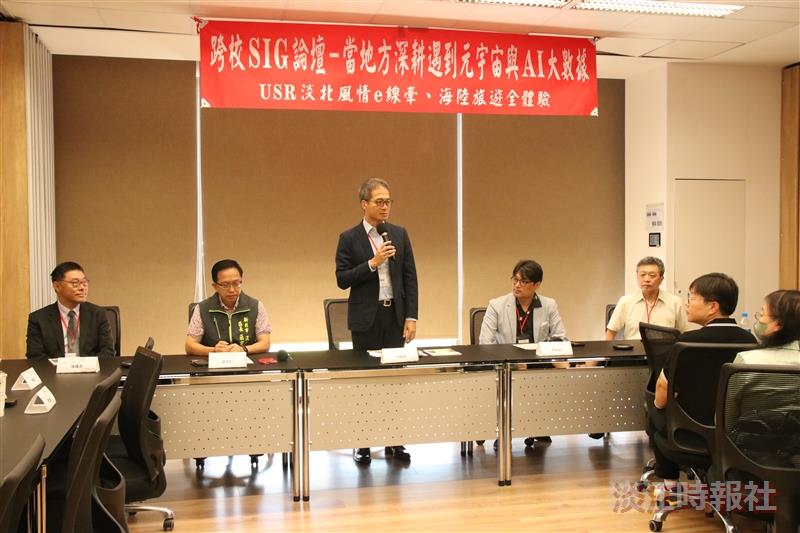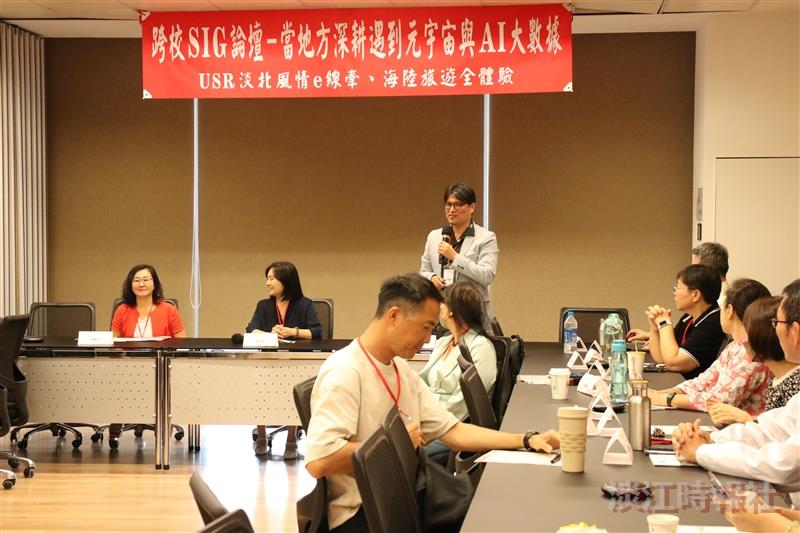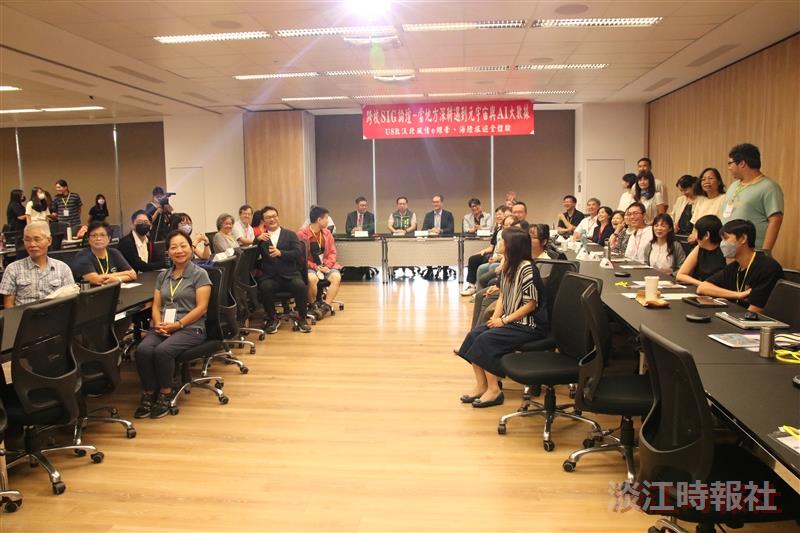News and Events
Metaverse+AI: TKU Hosts Intercollege USR Forum, Emphasizing Local Humanistic Care
Date 2023-10-02 838 Clicks

In order to preserve local historical and cultural heritage and apply it across various disciplines, our university's USR project team, “Exploring the Charms of Tamsui and the North Coast: A Holistic Land and Sea Travel Experience,”(淡北風情e線、海陸旅遊全體驗) organized the “Intercollege USR SIG Forum - When Local Deep Cultivation Meets the Metaverse and AI Big Data” on September 23rd at the Hsu Shou-Chlien International Conference Center. The forum invited scholars and experts from both within and outside the university to combine their expertise with historical elements and present a series of research findings in local studies, applied history, metaverse, creative graphics, and AI big data. The goal is to inject new vitality into local historical and cultural heritage.
The Vice President for Academic Affairs, Dr. Hui-Huang Hsu, stated in his speech that this USR project, presented in the form of a forum, allows the public to become acquainted with local history and culture. It also leverages the expertise of professors from different fields to promote a trend of local revitalization. Mr. Arthur Wu, the Director of Tamsui District, expressed his gratitude for the university's commitment to developing the USR project, deeply engaging with the local community, and integrating different historical facets of Tamsui. He hopes that more people will come to know and understand Tamsui.
The forum was first hosted by Dr. Lung-Chih Chang, the Director of the National Museum of Taiwan History. Professor Sinn-Cheng Lin from our university's Department of Information and Library Science delivered a special presentation titled “The Cross-Disciplinary Integration of Local Studies and Digital Humanities.” He explained that since 2013, the operation of the Tamsui Wiki Library has accumulated more than 3.88 million views. Through virtual platforms, they have engaged in digital collaborations to record numerous heartwarming stories using methods such as documentary filming, interviews with the elderly, field surveys, and e-book publishing. They have even incorporated aerial drone footage to provide different perspectives on changes in cultural history.
The first session, focusing on applied history, was moderated by Professor Yi-Ti Lin from the Department of English of our university. The 3 presenters in this session were Professor Chi-Lin Lee from the Department of History, Associate Professor Wen-Her Chen from the Office of Physical Education, and retired Professor Weitsy Wang from the Department of Mass Communication of Tamkang University. The panel discussion featured Professor Su-Bing Chang from the Graduate Institute of Taiwan History at National Taiwan Normal University, Assistant Professor Min-Chi Hsu from the Department of Marine Leisure and Tourism Management at Taipei University of Marine Technology, and Professor Yen-Ling Lin, who is also the Chief Audit Division Executive at our university.
Prof. Chi-Lin Lee talked about Historical Culinary Design: A Case Study of the Baozhong Yi-Min Banquet. He shared the background of designing the Yimin Banquet, which commemorates the
heroic actions of the Yimin (righteous people) who protected their homes during the Lin Shuangwen Incident in the 51st year of Emperor Qianlong's reign (1787). The banquet was designed to represent different ethnic groups, including Hakka (salted pork), Quanzhou (fresh abalone in spicy sauce), Zhangzhou (roast duck), Indigenous peoples (pork jowl with makauy), and the Lin Shuangwen army (lobster salad). Each dish has a unique historical significance, allowing guests to not only enjoy the food but also understand the origins and design symbolism of each dish. Prof. Lee emphasized, “History is a subject with depth, and regardless of one's future profession, it can be applied in one's work, often leading to unexpected rewards.”
Associate Professor Wen-Her Chen introduced the research on Feasible Strategies for Promoting Local Revitalization - A Case Study of Recreational Canoeing on the Tamsui River. He explained how weather and tidal conditions affect the suitability of canoeing on the Tamsui River. Since the Tamsui River mouth is located at the confluence of the river and the sea, there is a diverse range of aquatic species, necessitating protective measures before canoeing. He mentioned that recreational canoeing activities are not just for leisure but can be approached from a cultural and historical perspective. By integrating local specialty industries, they can attract tourists and achieve economic benefits.
Prof. Weitsy Wang presented on the topic of Application of Film and Television History - Community Documentary Project. She shared how she led students from the Department of Mass Communication to execute the Tamsui Humanities and Local Narratives Project. This project has completed documentaries on various aspects of Tamsui, including Tamsui Educators, Environmental Stewards, Food and Commodities, Community Members, and New Residents (available on the Tamsui Wiki). Students ventured into challenging environments to capture precious moments in Tamsui, deepening their sense of connection and identification with the town. She emphasized, “When students pick up a camera, it's not just about documenting; it's about falling in love with a city and establishing a profound connection with it.”
The second session focused on Virtual and Real Intelligence and featured Distinguished Professor & Associate Dean of School of Learning Informatics Hao-Ren Ke at National Taiwan Normal University, as the host. The 3 presenters were Dr. Chih-Ming Chen, Distinguished Professor of the Graduate Institute of Library Information and Archival Science and Director of the Research Center for Chinese Cultural Metaverse in Taiwan at National Chengchi University; Associate Professor Yi-Wen Chen from the Department of Business Administration at National Taipei University of Business; and Assistant Professor Yu-Ling Chen from the Department of Marketing and Logistics Management and the Master's Program of Service Industry Management at National Penghu University of Science and Technology. They presented on the topics of The Application of Chinese Cultural Metaverse in Digital Humanities Research and Cultural Communication, Using Big Data Analysis to Understand Local Needs, and AI New Taipei City Impression and NPO Community Creation, respectively.
The third session's theme is “Books and Pictures: Different Paths to the Same Goal.” It is moderated by Dr. Wan-Bau Wu, Dean of the College of Foreign Languages and Literatures at our university. The speakers include Chen Lijuan, Assistant Professor in the Department of French, Xie Minqi, Assistant Professor in the Department of Chinese, both from our university, and Tsai Zaomin, Associate Professor in the Department of Taiwanese Literature at Aletheia University and Director of Tamsui Community College. They respectively discuss "The Application of Foreign Language Expertise in Local Cultural Promotion: A Case Study of Illustrated Collections," "Narrative Strategies in Local Picture Books," and "From Singular to Cross-Disciplinary: Exploring Curriculum Integration through the Example of 'Enjoy Tamsui'."
SDGs #SDG04 Quality Education #SDG09 Industry, Innovation and Infrastructure #SDG11 Sustainable Cities and Communities #SDG12 Responsible Consumption and Production #SDG17 Partnerships for the Goals
LINKS
- PREV:The 2023 Formosa International Poetry Festival: Autumn Breezes and Poetic Sentiments in Tamsui 2023-09-25
- NEXT:Visit from UML for Active Discussions on Dual-Degree Programs 2023-10-02
- Crossing Seas for Exchange with Waseda University: Dr. Chiu-Kuei Tseng Visits Haruki Murakami 2024-04-08
- Formosa Scholarship Donor Visits President at School 2024-04-08
- TQM Seminar: Exploring New Chapters in Leadership Wisdom and Green Practices Together 2024-03-29
- Mass Communication Alumnus Chien-Hung Lien's Work Salli Wins Award in Osaka 2024-03-25
- 256 Young and Aged Volunteers Served at the Wan Jin Shi Marathon 2024-03-25
- North Tamsui USR Project: 10 Delicacies Revive Mackay’s Missionary Journey in Taiwan 2024-03-25
- Administrative Unit Digital Transformation and Net Zero Exhibition, President Keh Acknowledge Smart Initiatives for Sustainability 2024-03-25
- 2024 Net Zero Transition Alliance Summit: Inviting Alumni Enterprises to Collaborate in Cultivating Sustainability Talents 2024-03-16
- Alumni Reunion Spring Feast: Samuel Su and Jian-Fu Li Lead Singing of School Anthem, Andy Chen Donates NT$16.25 Million 2024-03-16
- Tamkang Shines at University Expo, Faculty and Students Unite in Recruitment Efforts 2024-03-11

